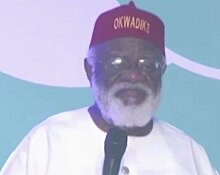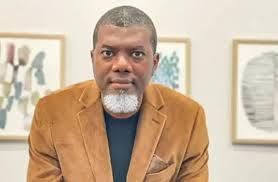Since his death, the media space has been filled with stories of the life and times of Dr Chukwuemeka Ezeife, the Harvard-trained economist and first civilian governor of Anambra state.
He has merited the Igbo adage that the gong calls a hero twice: while alive and at death. Indeed, Ezeife was loved by people. he was Okwadike Igbo Ukwu (his home town), Garkuwan Fika (Yobe State) and other numerous chieftaincy titles bestowed on him from parts of Nigeria.
He was a courageous man who was strong enough to speak truth to power and bear the devastating consequences on his personal comfort. He was many things rolled into one, a philosopher, statesman, Igboist, nationalist, political economist, activist, humanist, and humorist. He was a major voice against the marginalisation of Igbo people in Nigeria.
He was global in his activism. Okwadike was national too, and within these wider dimensions, he was still a vocal defender of his Igbo people in their struggle for a better existential space in Nigeria’s national politics that consistently tries to push them out of relevance in the scheme of national matters. Only men of impeccable integrity can combine national politics and the defence of their marginalized ethnic groups. There is an unwritten law that you cannot benefit from the oppressive national politics and turn around to condemn it for being unfair to your people.
Many Igbos who have broken into national politics find it convenient to keep quiet while Igbos are subjected to all manners of rejection and humiliation by successive regimes. Ezeife was different. His voice was consistently loud in defence of Democracy and against the relegation of Igbos in Nigeria’s politics.

This perhaps explains why he was not as rich as those who traded Nigeria’s progress or Igbos’ wellbeing for personal wealth accumulation. In defence of Nigeria’s Democracy, Okwadike joined other courageous and fearless Nigerians in the group called National Democratic Coalition (NADECO) in the risky and dangerous demand for the actualization of June 12 presidential election won by Chief M. K. O. Abiola but annulled by the military junta in power in 1993. It was a risky agitation that eventually cost Abiola and his wife, Kudirat their lives.
A former governor of Ogun State, Chief Olusegun Osoba, gave a clear insight into the circumstances surrounding the birth of the National Democratic Coalition (NADECO) that served as catalyst for the struggle over the annulled June 12, 1993 election. In his book entitled “Battle lines: Adventures in Power,” the seasoned administrator and journalist narrated how he and other eminent fearless Nigerians faced the soldiers and their guns.
Osoba recalled: “As we mobilised against the regime, there were several formal and informal groups formed by people working for the actualisation of the June 12 mandate. I was in a small group with Dr Chukwuemeka Ezeife, Chief John Oyegun and Dr Doyin Okupe.
“Eventually, 49 people representing these organisations signed the document establishing NADECO….The founding 49 signatories to NADECO were: Chief Michael Adekunle Ajasin, Mallam Lawal Dambazzau, Commodore Ebitu Ukiwe, Chief Anthony Enahoro, Major General Adeyinka Adebayo (retd.), Chief Bola Ige, Commodore Dan Suleiman, Dr Chukwuemeka Ezeife, Professor Anya O. Anya, Colonel Yohanna Madaki, Reverend Father Moses Adasu, Dr Beko Ransome-Kuti, Reverend Tunji Adebiyi, Chief Ade Ojo, Chief Ralph Obioha, Chief Empire Kanu, Chief Michael Anyiam, Dr. Sola Soile, Vice Admiral Akin Aduwo, Chief E. Duru, Mr. Nick Dazzang, Mr. Labaran Maku, Dr A. A. Akingba, Mr Babas Eko Oyekanmi, Mr Alex Ayatolla, Mrs Sarah Jubril, Alhaji Ganiyu Dawodu, Mr O. P. Edodo, Mr A. Barber, Otunba Olabiyi Durojaiye, Chief Olusegun Osoba, Chief John Odigie-Oyegun, Prof. Bolaji Akinyemi, Alhaji Mohammed Siraj Hamza, Dr. Wahab Dosunmu, Otunba Aboyade Cole, Major General Olufemi Olutoye (rtd), Chief Sobo Sowemimo, Dr. Steve Achema, Chief Olaniwun Ajayi, Chief Olu Falae, Brigadier-General Jonah Jang, Chief Abraham Adesanya, Chief Ayo Adebanjo, Mr. Alao Aka-Bashorun, Mr. Emmanuel Njiwah, Chief Vincent Nwizugbo and Dr. Uma Eleazu.“ (Source: nadecousa.com).
Dr Ezeife’s name occurred and recurred consistently in the history of NADECO.
The Nigerian Tribune Newspaper in its interview with Okwadike published on 24th June, 2020 titled “If Igbo don’t get presidency in 2023… —Ezeife”, described Ezeife as “a leading figure in the National Democratic Coalition (NADECO) and campaign for restructuring….” In that interview, it was vintage Okwadike as he dissected Nigeria’s problems and those of his Igbo people of the South East.
Reviewing their deadly NADECO struggles and how Democracy had benefitted Nigerians since 1999, Dr Ezeife said: “The journey so far seems to be like going from light into darkness. Many Nigerians are thinking it is over with Nigeria. Some people are waiting for the total collapse. There is insecurity everywhere. And many people think that nobody shows concern on all the negatives. What is worse today is that conscience is dead in Nigeria …” but as a committed patriot he expressed strong optimism that a “new Nigeria must come up.”
Ezeife was not a blind or armchair critic. He had very clear ideas about what went wrong with Nigeria and how to get the country working again.
“Between 1945 and 1966, Nigeria was making progress. To attest to that, the World Bank itself declared that parts of Nigeria were growing faster than the rest of the world. This part of Nigeria, Eastern Nigeria and part of Western Nigeria were included. In 1966, there was a coup and the military who ruled Nigeria from that point till today comprehensively ruined Nigeria.
“First was the Civil War. For Nigeria to win the Civil War easily, people decided to isolate the Igbo from the rest of the East. And there was a change in the structure of Nigeria from regions to states. 12 states were created by Yakubu Gowon. So, a structural change occurred. Even after the war, we didn’t go back to the structure that worked.”
“So, those who can see have called for restructuring. Restructuring transcends going back to the structure of Nigeria which worked well at its own pace and gave motivation for every region to develop and compete with the rest.
“However, to restructure is problematic because some people are confusing restructuring with resource control. Some people think that the moment you restructure, regions must control their resources and the oil money will not flow the same way. I think that it is wrong. We will negotiate it; It is not automatic that in restructuring; oil money is (no longer) flowing to the North or to any part of the country.
“Well, before we cut off oil money from everywhere, we must have created the replacement in Internally Generated Revenue (IGR). 2014 confab (National Conference) has all the solutions we need in this country. It was the most representative, thoughtful, robust effort to revive Nigeria.”
He also lamented that the Federal Character principle as enshrined in the Nigerian constitution has not been implemented faithfully:
“But, the federal character provisions seem to be completely dead in application. It is obvious in terms of appointments in the military, security, headship of security bodies, appointments in every dimension. Every sector is dominated by one group, not even one geographical zone. One religious group dominates appointments.
“The Federal Government is taking actions that put some parts of Nigeria out of Nigeria and some elements of Nigeria to be lords and masters over the others.
“Earlier, I told you that conscience is dead in Nigeria. We have to resurrect conscience before we can make progress.”
He spoke stridently on the lots of Igbos in Nigeria thus: “The government is pushing the South-East out of Nigeria. The Federal Government has policy, a policy of “pull Igbo down”, “push Igbo out of Nigeria”.
“Inspite of the federal character, how many of those in east are remembered in terms of appointments? Go to Nigerian National Petroleum Corporation (NNPC), the top jobs there, do you find South-East there? How many south-easterners have oil wells, not even South-East?”
Concerning the agitation for Igbo president in 2023, Ezeife reminded Igbos to work hard to actualize it insisting that the president of Nigeria would not be dashed to Igbos.
“But, the Igbo shouldn’t wait to be dashed the presidency. If need be, they must kneel to the West and South-South to agree. They must kneel for the North to beg them. They must kneel for the Middle- Belt to beg them; they must beg all Nigerians and beg every effort to do all that is right to producing a president for Nigeria.
“And we know that fairness, equity and justice will require that we get it. Yet, we must do all that is necessary and if at the end, the Nigerian people don’t vote for our man, we will take it that Nigeria has rejected our citizenship of Nigeria. And person rejected doesn’t reject himself.
“The South-East will give Nigerians somebody who will fix and elevate Nigeria, somebody who will elevate our economy leading to exclusive growth in the economy.”
Dismissing fears in some quarters that Igbo president would be a boost for secession, Okwadike said: “All kinds of things are said in defense of the present situation of pushing the Igbo out of Nigeria by Federal Government,…. But I’m sure you know that Igbos make Nigeria look like a nation. This is because anywhere you go in Nigeria, you see them. Let us forget this “lie-lie.”
“Everybody knows the truth that we, Igbo, believe in Nigeria. Even, after being tortured, we remain there. Igbo president of Nigeria will change Nigeria for good, modernise Nigeria, develop Nigeria and make every Nigerian equal.”
As we bid him farewell, there is, perhaps no better tribute we can pay to Ezeife than the one he paid to Pa Anthony Enahoro on December 18, 2010 when Enahoro died.
In that masterpiece of a tribute, Okwadike said: “Like the gem he was, all Nigerians irrespective of political leaning must mourn him because he gave all his life to political engineering of Nigeria, starting from 1957 when he proposed independence motion, he never looked back. He lived long and that was for the purpose of giving us guidance and direction.
“He died in active selfless service, guiding us. He lived a purposeful life and committed it all to service of mankind.”
That was Ezeife to Pa Enahoro. Need we say more in praise and appreciation of Okwadike’s selfless service to Nigeria and Nigerians?
Dr. Chukwuemeka Pius Ezeife, Okwadike Igbo Ukwu, died at the Federal Medical Centre Abuja on Thursday, December 14, 2023, at the ripe age of 86. He will be buried on Saturday, 20th of April, 2024 at his home in Igbo Ukwu town by 2pm.
Muogbo ([email protected], 08072000079) is an Abuja-based Journalist



























